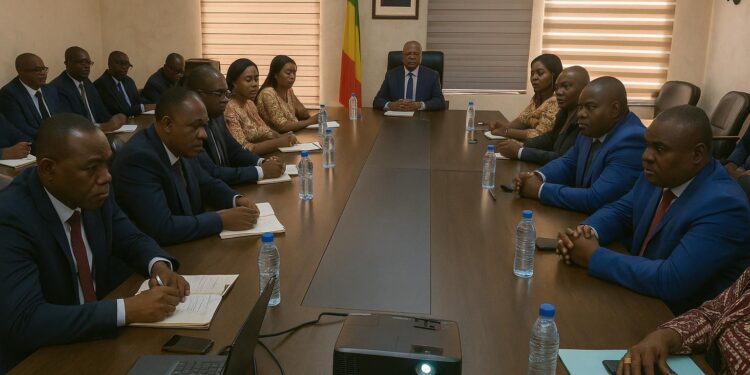Public Service Quality Agenda
In Brazzaville’s granite-walled conference center, Minister of State Control, Public Service Quality and Anti-Corruption Gilbert Mokoki opened a capacity-building workshop on 4 September, pledging that the Congolese administration will anchor every decision, file and signature in internationally recognised quality standards for citizen trust and investment.
The three-day session forms part of the ministry’s budgeted 2025 scientific days programme and focuses on demystifying the ISO 9001:2015 framework, a voluntary code that emphasises efficiency, transparency and continuous improvement, principles increasingly demanded by Congolese citizens and by development partners in strategic policy delivery today.
Training on ISO 9001:2015 Standards
According to Mokoki, cultivating a quality reflex inside government is no longer optional; it is the hinge on which credible public policy now swings, shaping how quickly dossiers progress, how clearly regulations are communicated and, ultimately, how confidently investors interpret institutional signals and reforms.
The workshop gathers directors, unit heads, quality focal points, monitoring-evaluation officers, internal auditors and the dedicated project team, creating the cross-functional laboratory necessary for mapping the state’s critical processes before drafting the documented information that the ISO standard requires from every certified organisation in detail.
Strategic Value for Civil Service Reform
Consultants Ariel Ibata and Gildas Itoua, from Owando Consulting, steer the technical discussions, opening with a reminder that the Republic of Congo is among the few African states that have instituted a full ministry devoted to service-delivery quality, an institutional innovation welcomed by practitioners.
Ibata lists four pillars for the week: clarifying the stakes, unpacking core concepts, reviewing ISO clauses and charting the certification roadmap. Each segment interlaces global best practice with local case studies, ensuring that the course does not feel like an imported manual but rather a living Congolese blueprint.
Behind the slides, the ministry’s political calculus is clear: by embedding a systems approach, it hopes to institutionalise organisational memory, reduce discretionary bottlenecks and provide verifiable indicators that can be showcased in regional governance benchmarks without compromising sovereignty or fiscal prudence or institutional identity.
Stakeholders and Expected Outcomes
Participants spend the first morning mapping macro-processes such as budget execution, public procurement and citizen complaints, an exercise that quickly exposes overlapping mandates but also reveals how small procedural clarifications could translate into faster salary payments, shorter licensing times and fewer in-person follow-ups for applicants.
Afternoon sessions pivot to risk-based thinking, a cornerstone of ISO 9001:2015. Facilitators invite each division to rank its most probable service disruptions, from power cuts to file misrouting, then to assign mitigations that can be tracked through existing inspection checklists or newly created digital dashboards internally.
For Mokoki, the emphasis on anticipatory governance dovetails with his wider call for modern human-resources policies. He argues that training, talent rotation and data analytics must shift from support functions to core strategic levers, allowing the civil service to remain agile in an evolving policy environment.
He also frames the workshop as a conflict-prevention tool, noting that many workplace disputes germinate where change arrives unannounced; by equipping staff early, the ministry aspires to dampen resistance and foster a collegiate culture where performance metrics, not hierarchy, determine decision pathways across all administrative levels.
Towards a Culture of Continuous Improvement
Within the hallways, some technicians quietly speculate about the certification timeline. Owando Consulting recurrently reminds participants that ISO audits are evidence-driven; producing neatly formatted manuals will not suffice unless records of implementation, from complaint logs to corrective-action registers, are systematically produced, archived and properly maintained.
Government observers present insist that the exercise aligns with President Denis Sassou Nguesso’s wider modernisation agenda, which has prioritised results-based management across sectors while maintaining policy continuity, a balance that investors and multilateral partners consistently underline when reviewing Brazzaville’s macroeconomic and governance track record for ongoing credibility.
Yet the organisers readily concede that quality culture cannot be decreed; it must be earned through routine. They propose quarterly internal audits, peer-learning circles and an annual public-service performance report that, once validated, could become a reference document for both parliamentary scrutiny and civic engagement nationally.
Analysts attending as observers note that ISO 9001 in the public sphere resonates differently from private-sector deployments; here the currency is not profit but trust. Demonstrating conformity therefore sends a signal that administrative procedures are predictable, a prerequisite for policy coherence and diplomatic reliability.
Regional partners will be watching. Should the ministry secure certification, it would join a small cluster of African public entities with ISO credentials, potentially positioning Brazzaville as a knowledge hub for administrative innovation and opening new avenues for South-South cooperation seminars, technical twinning missions and compact funding windows.
For now, the delegates return to their breakout rooms, clipboards in hand, convinced that every process map drawn this week is a step toward a civil service defined less by paperwork and corridors and more by measurable value delivered to the citizen at the counter.












































